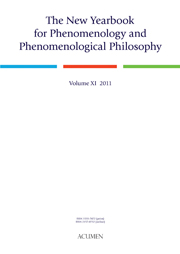Book contents
- Frontmatter
- Contents
- Articles
- Discussion
- Jacob Klein's Two Prescient Discoveries
- On the Mathematical Representation of Spacetime: A Case Study in Historical–Phenomenological Desedimentation
- Splitting the Movάς: Jacob Klein's Math Book reconsidered (Part I)
- History of Physics and the Thought of Jacob Klein
- Jacob Klein on the Dispute Between Plato and Aristotle Regarding Number
- Klein on Aristotle on Number
- The Philosophical Achievement of Jacob Klein
- In Review
- Conclusion
Klein on Aristotle on Number
from Discussion
- Frontmatter
- Contents
- Articles
- Discussion
- Jacob Klein's Two Prescient Discoveries
- On the Mathematical Representation of Spacetime: A Case Study in Historical–Phenomenological Desedimentation
- Splitting the Movάς: Jacob Klein's Math Book reconsidered (Part I)
- History of Physics and the Thought of Jacob Klein
- Jacob Klein on the Dispute Between Plato and Aristotle Regarding Number
- Klein on Aristotle on Number
- The Philosophical Achievement of Jacob Klein
- In Review
- Conclusion
Summary
Abstract: Jacob Klein raises two important questions about Aristotle's account of number: (1) How does the intellect come to grasp a sensible as an intelligible unit? (2) What makes a collection of these intelligible units into one number? His answer to both questions is “abstraction.” First, we abstract (or, better, disregard) a thing's sensible characteristics to grasp it as a noetic unit. Second, after counting like things, we again disregard their other characteristics and grasp the group as a noetic entity composed of “pure” units. As Klein explains them, Aristotle's numbers are each “heaps” of counted units; in contrast, each of Plato's numbers is one. This paper argues that Klein is right to understand a noetic unit existing in the sensible entity, but that his answer to the second question is not consonant with Aristotle's insistence that Plato cannot account for the unity of a number, whereas he can. Slightly modifying Klein's analysis, I show that Aristotle's numbers are each one.
Keywords: unity of units in a number; abstraction; Jacob Klein; counting; Aristotle's account of number; Plato's account of number.
Let me begin with a story. The year was 1976, and I was writing a dissertation on Aristotle's Metaphysics. For reasons I can no longer recall, I decided to spend the summer in London working at the British Library, then still located in the British Museum. After some weeks on my own, I began to look around for people who were working in my area.
- Type
- Chapter
- Information
- The New Yearbook for Phenomenology and Phenomenological PhilosophyVolume XI 2011, pp. 271 - 281Publisher: Acumen PublishingPrint publication year: 2012



